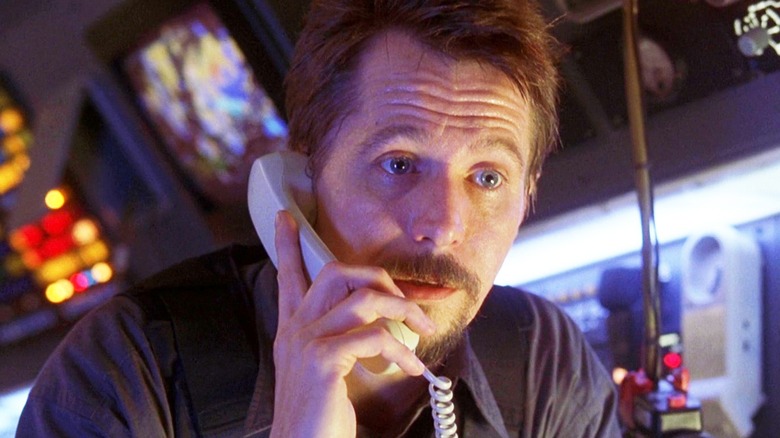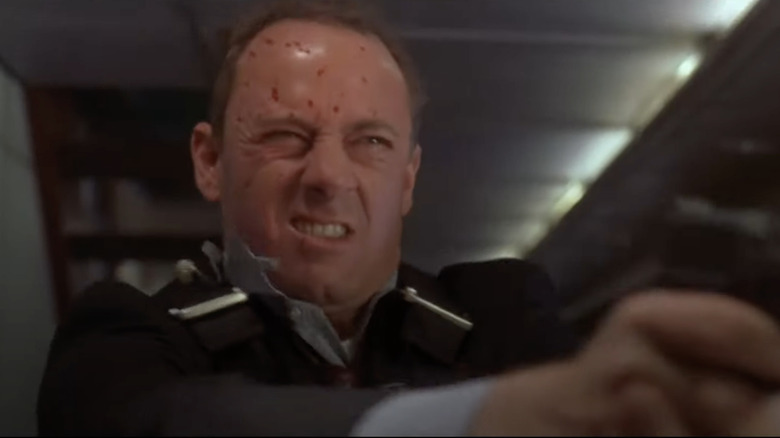Air Force One Had A Villain Backstory That We Never Got To See
"Air Force One" is my favorite "Die Hard" knock-off. Directed by the late Wolfgang Petersen and released in 1997 (when the Cold War was newly over and America was an unrivaled superpower), the film features terrorists hijacking — what else — Air Force One. President James Marshall (Harrison Ford), a Vietnam War veteran, personally defeats them.
Making the President of the United States into John McClane, the quintessential "in the wrong place" everyman? That's some ridiculous high-concept moviemaking I can get on board with.
Now as for the villains, Gary Oldman does his best Hans Gruber as Egor Korshunov. We know what he wants: a restored Soviet Union. When he's called about his demands, he waxes poetic about seeing "The capitalists dragged from the Kremlin," and he throws in Marshall's face about how America has "given [Russia] to gangsters and prostitutes." (Considering pro-U.S. Russian President Boris Yeltsin sold off the country to oligarchs that have helped prop up Vladimir Putin ... yeah, history may have vindicated Korshunov on this one.)
While Korshunov is the villain everyone remembers (how could he not be with Gary Oldman hamming it up?), he's arguably not the most important one. Secret Service Special Agent Gibbs (Xander Berkeley) is the terrorists' inside man and the final threat Marshall must overcome. Unlike Korshunov, we learn little about Gibbs, so his presence seems perfunctory. He's there to explain how the terrorists get past the Secret Service and provide one more action beat once Marshall tells Korshunov to get off his plane.
Screenwriter Andrew W. Marlowe had ideas for more, though, which he divulged in a recent conversation with SyFy.
Getting onto Air Force One
Now, Marlowe says the exact backstory he wrote for Gibbs has been "lost to the wind. It's been 28 years since I wrote it." However, he was able to paint the broad strokes and specify that it was a "financial motivation," not a "political motivation" ("This was at a time when the Secret Service was considered apolitical," Marlowe adds).
"[Gibbs] was a guy whose career never got to where he wanted it to be and he could never afford the things he wanted in life. He didn't feel special in his world and those are the ingredients for somebody who can be cultivated, somebody who can be turned, somebody who can be paid off."
The problem is that Gibbs only reveals himself as a traitor to Marshall when they're trying to evacuate the crashing plane. According to Marlowe, Petersen felt this was the wrong time for any more exposition: "Hey, we can't stop the movie when it's the face-off between the president and the Secret Service agent to have this explanation," he recalls the director saying.
Instead, Gibbs' motivation is vaguely alluded to when Korshunov throws some patriotism back in Marshall's face: "Mr. President, do you know how I got on this plane? Money. God bless America."
According to Marlowe, "couch[ing]" the motivation in Korshunov's worldview like this reinforces his motivations: "In his mind, the capitalist system corrupts." Marlowe continues, "We've seen these people who have been traitors to our country, who have been cultivated as assets and they've been paid off. They're getting their money and they've lost their belief system. So for me, that was interesting enough, looking at it ... from Gary Oldman's character's side."
I think this was the right call; Gibbs doesn't need motivation beyond money, nor does there need to be a deeper exploration of that. After all, no one watches "Air Force One" for the politics.

